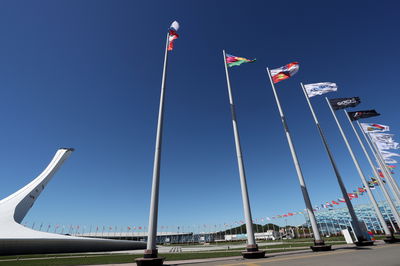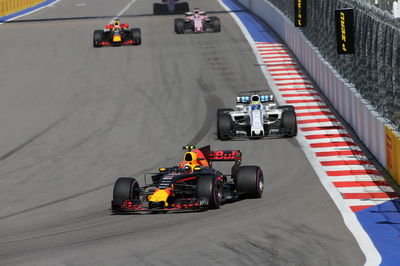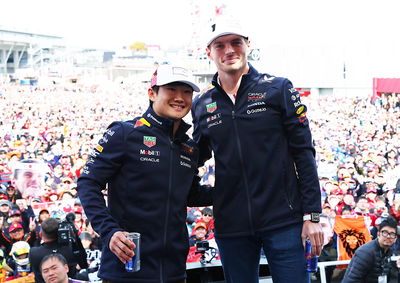From Russia with love? It's complicated...

By Ollie BarstowFollow @OllieBarstowF1 on Twitter
Doping scandals, blanket bans from the Olympics, medical record hacking leaks and boycotts of events hosted within its borders... Russia has not only been the centre of most controversies between now and the last time F1 stepped foot in Sochi twelve months ago, in many cases it has been the explosive nucleus.
And this is just in the context of sport... Crash.net isn't the publication with which to begin tackling the more serious issues making headlines in 2017 alone, even if we should all endeavour to be acutely aware of them.
However, in the week Russia in sport hits the headlines again as Maria Sharapova - arguably its most famous sporting superstar - returns to action under a stormy cloud that will likely follow her for the remainder of her tennis career following a 15 month ban for a failed drugs test, it is perhaps fitting we find ourselves returning to an atypical Bernie Ecclestone-engineered event many assume will not form part of Liberty Media's grand scheme for the future of F1.
Nevertheless, just as Sharapova is - in accordance with sporting regulations - vindicated in receiving the chance to redeem her reputation as she emits her first grunts on court since January 2016, there are solid reasons as to why Russia should retain its spot on the F1 calendar during the brave new world of a Bernie-free era.
In a motorsport context, anyway.
 |
Strictly speaking, it is actually surprising a nation with such a rich pedigree in sport (doping notwithstanding) has taken so long to develop a motorsport industry, even if there have been some - questionable - attempts over the years.
After all, once upon a time Ecclestone aspired to take the sport far beyond the Iron Curtain during the 1980s to the point where the Grand Prix of the Soviet Union was provisionally included on the 1983 F1 schedule with a race intended to be held in Moscow.
With different, yet similarly ambitious plans failing to progress beyond the drawing board over the coming decades,
it would take more than 30 years for the inaugural Russian Grand Prix to occur, taking place around a permanent 'street' circuit in Sochi, developed as part of its ambitious - if flawed - legacy for the Winter Olympics the city hosted that same year.
 |
Flat, high-speed and walled, the Sochi Autodrom wends between several of the venues used during the most expensive Games ever held, offering a distinctive - and somewhat dystopian - backdrop to one of the more unique Hermann Tilke creations. There is even a theme park that when lit up at night appears 'Disney-esque' albeit without the whimsy and - based on previous years - customers...
Indeed, Sochi is one of the year's more unusual locations for an F1 race. Squeezed between mountains and the sea, it is billed as a ski-sport-beach resort, even if you are more likely to find shingle rather powdery soft sands wedged between your toes when you take to the coastline. Put it this way, with Sochi unfurling 90 miles along the gusty Black Sea coastline, its twin city of Long Beach is more a literal comparison than a visual one.
In terms of legacy, the Russian Grand Prix is unmistakably viewed as one of Bernie Ecclestone's proudest projects, his unnerving admiration towards President Vladimir Putin and the reportedly huge sums the government is willing to pay to maintain its place on the F1 schedule (considered to be upwards of ?50 million) allowing organisers plenty of leeway when it comes to deciding where, when, what and how.
 |
After all, when Bernie stays until the 'end' of a grand prix just to enjoy being sat pride of place next to President Putin, you know how seriously he is taking such a deal.
So with Bernie having now exited stage left (or is that right?), will we be seeing Russia follow suit? Not necessarily...
Personally, there are some elements of the Sochi Autodrom I am fond of. A forgettable debut race notwithstanding - coming directly after the tragic Japanese Grand Prix many want to forget -, the last couple of seasons have delivered some engaging racing, even if it has stemmed from or been negated by the occasional farce (almost non-existent tyre degradation, a tanker dropping oil on the circuit, dodgy barriers)
The crowds have been spirited and lively too, despite the somewhat jarring vision of pearly-toothed volunteers directing you amidst the camo-clad, rifle-equipped army out in force conducting ever so thorough security checks.
Then again, there remain some baffling issues. The limited accommodation has for some forced a toss-up between long transfers and better positioned but more challenging local B&Bs, while the dearth of local restaurants is magnified by the often bewildering waiting times for the food - one year we ordered a pasta dish that turned up 90mins later. And was wrong.
However, whilst the travelling F1 circus has at times turned its nose up when Sochi is compared with other locations on the calendar (myself included), in the strictest terms of a motorsport culture, Russia is proving it should fight for its spot on the schedule.
Indeed, Russia's footprint in motorsport has been growing rapidly in recent years, not just in terms of drivers but teams, investors and events, both in numbers and quality.
 |
When Vitaly Petrov made his F1 debut in 2010 he was fairly quickly dismissed for the wealth he brought to the watered-down Renault team, but from Russia's first F1 driver he'd become its first points-scorer and podium winner in the ensuing three seasons he raced in the top flight.
Though Russia has seen only Daniil Kvyat follow him into F1 since - becoming a multiple podium winner himself -, a look across the sport shows how broad the Russian influence has become.
RUSSIAN TIME has developed into a respected race-win contender in Formula 2 (n?e GP2) and has even moulded its own prot?g? in Artem Markelov, now a winner and seemingly a genuine contender for the title this year too having shared the spoils in the Bahrain opener two weeks' ago.
Elsewhere, SMP, one of Russia's leading banks, has been busily developing its own junior development programme and race teams - think Red Bull without the drink and more of the roubles - for drivers to rise the ranks in Le Mans, Formula 4, IndyCar and Formula V8 3.5, while that 'butt of many a joke' LADA has even competed with good success in the World Touring Car Championship.
Perhaps more cynically, there is no denying Russia is also a mammoth market for sponsors and especially manufacturers.
You cannot escape the Mercedes billboards on arrival in either Moscow or Sochi, while Renault - which has a part stake in the government-subsidised AutoVAZ company that builds LADAs - sells some of the nation's best sellers on the road.
It's worth pointing out that GP2 race winner Sergey Sirotkin - who will drive in FP1 this weekend - is now just a stone's throw away from F1 and is surely 'next-in-line' should Renault decide it needs to shuffle its driver line-up in the future. Nationality and commercial gain shouldn't alone be a reason to land an F1 drive (though it has many times before), but Renault won't deny Sirotkin makes a tempting prospect across the board.
Of course, it is easy to dismiss the Russian Grand Prix as a 'peak Bernie' project held in an admittedly soulless corner of the world's largest nation that seems at odds with new owner Liberty Media's idea to bolster US audiences, protect historic venues and ramp up the spectacle.
However, on a calendar of Bahrains, Azerbaijans and Malaysias, it must be noted that at least Russia is developing some sort of future (and subsequent legacy) to justify its spot on the schedule.
 |
Either way, the event has reportedly agreed a new deal that will see the Sochi Autodrom host the Russian Grand Prix for another decade - during which it could become a night race to make use of surrounding facilities that actually sparkle beautifully once the sun sets - and it has notably gained a first title sponsor for this year's event. Furthermore, spectator numbers have grown since that 2014 debut, though you may have to take some of those reports with a hyperbolic pinch of salt.
So while the Sochi Autodrom itself - shadowy towering grey grandstands, questionably barren surroundings and increasingly rough edges as the Olympic gloss fades - is never likely to tease the senses, to say Russia itself shouldn't have a spot on the F1 calendar at least compared with others on the schedule are perhaps a little wide of the mark.
As I said before though, this is at least in a motorsport context.
Does Russia generally deserve its place on any international sporting schedule on moral grounds?
That, my friends, is a much wider debate...
 |











